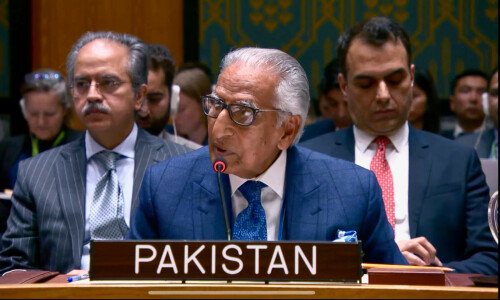ISLAMABAD: A British prosecution witness on Wednesday told an antiterrorism court conducting the Dr Imran Farooq murder trial that he had informed the UK police about the disappearance of his colleague Syed Mohsin Ali, one of the accused, and a police officer informed him that he had been deported to Pakistan.
UK authorities had never acknowledged the arrest or deportation of any suspect involved in the assassination of the Muttahida Qaumi Movement leader who was murdered outside his home in London in 2010.
In June 2015 — around five years after Dr Farooq’s murder — the Frontier Corps claimed to have arrested Mohsin Ali and Khalid Shamim at Chaman, Balochistan, while crossing into Pakistan from Afghanistan.
Mohsin was wanted by the UK authorities for allegedly stabbing Dr Farooq to death along with suspect Kashif Khan Kamran and they always maintained that both of them had left their country after the assassination.
Court has recorded statements of 13 British prosecution witnesses via video link
Shamim, according to a petition filed by his wife in the Sindh High Court, was missing since Jan 6, 2011, and was an accounts officer at the Karachi Water and Sewerage Board.
ATC judge Shahrukh Arjumand continued the trial proceedings on Wednesday, which was a public holiday in connection with Kashmir solidarity day, since the prosecution had made the British prosecution witnesses available from Feb 3 to 7.
The ATC in three consecutive days has recorded the statements of 13 British prosecution witnesses via video link.
In his testimony, witness Sheikh Moinuddin informed the judge that Mohsin Ali was his colleague as both were working in the same shop.
He testified that he rented out a room in his house to Mohsin for £40 per week. He said that Mohsin disappeared in September 2010 and did not respond to his calls, adding that his college fellows were also unaware of his whereabouts.
“Subsequently, I informed the police about his disappearance and also told the police how Mohsin looked like. The police officer told me that Mohsin had been deported to Pakistan,” he deposed.
Another prosecution witness, Mohammad Akbar, a taxi driver by profession, testified that accused Moazzam Ali had emailed him and asked if he could arrange his stay at his residence in the UK.
He said that since he was living in a small house, he referred Ali to a friend, Shahzad, and on the former’s arrival picked him from Heathrow Airport and dropped him at the latter’s residence.
Recollecting his first meeting with accused Ali, the witness said that it was the wedding ceremony of Altaf Hussain where he had met Ali.
“Ali visited the UK three to four times and I visited Pakistan twice,” the witness said, adding that he also visited the MQM’s headquarters Nine Zero during one of his visits where he noticed presence of some armed persons. “I never visited this place again,” the witness added.
Mutual Legal Assistance
After the court’s proceedings, Toby Cadman, a British lawyer engaged by the Pakistani government, while talking to media persons, appreciated the prosecution.
In September, Cadman disclosed that the British government had agreed to share evidence related to the inquiry into Dr Farooq’s murder with Pakistan under the Mutual Legal Assistance (MLA).
Initially, the UK authorities had not responded to Pakistan’s request for MLA. The UK government had been reluctant to hand over the evidence to Pakistan since European laws did not permit the sharing of evidence with a country where the offence is punishable by death.
However, the Pakistan government had assured the UK government that if convicted, the accused would not be given the death penalty and also that the related law would be amended.
The trial had come to a standstill since 2018 as the prosecution case was stuck because of non-availability of evidence.
The Islamabad High Court had directed the ATC of Islamabad to conclude the much delayed trial by October 2018.
Two suspects in the case — Khalid Shamim and Syed Mohsin Ali — have recorded their confessional statements before the magistrate, saying that Dr Farooq was killed because he was a “potent threat to the leadership of the MQM”. However, these suspects later backtracked from their confessional statements, saying they had recorded the previous statements under coercion.
The third suspect, Moazzam Ali, has not recorded his confessional statement.
The ATC has indicted the accused under various sections of the Pakistan Penal Code (PPC) and the Anti-Terrorism Act (ATA), 1997, related to the murder, abetment and hatching a conspiracy to kill.
On Dec 5, 2015, the FIA registered a case against the MQM chief and other party leaders for their alleged involvement in the 2010 murder.
Published in Dawn, February 6th, 2020


















































